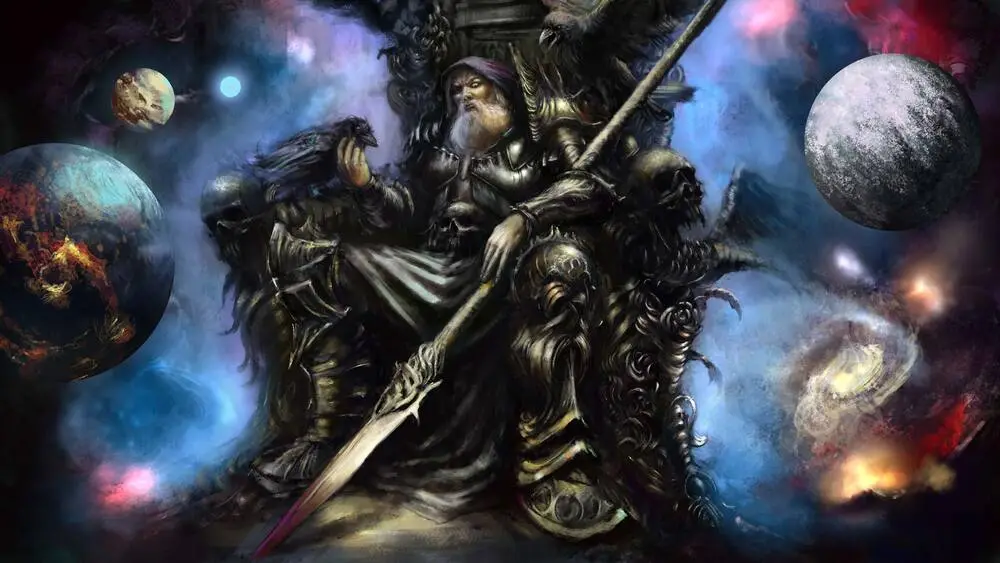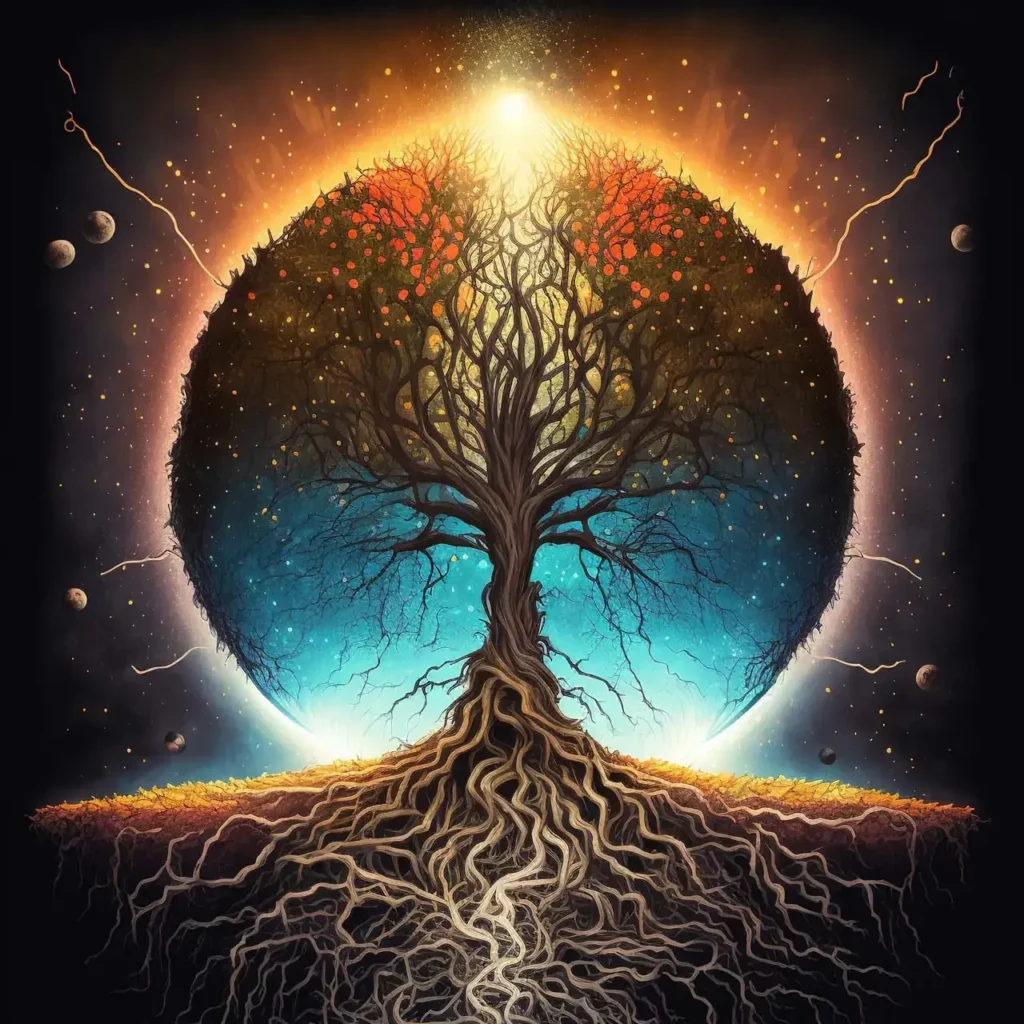What is

odinism?
Learn about the ideas that shape its beliefs
What is Odinism?
Odinism: Unraveling the Threads of Spirituality
Odinism is an ancient religion based on the spiritual beliefs and practices of the ancient Norse people, who lived in what is now Scandinavia and other parts of Northern Europe. It is a polytheistic religion, meaning it worships multiple gods and goddesses.
Odinism is also known as Asatru, or the Heathen religion, which means “faith in the gods” in Old Norse. It is named after their god Odin, the chief god in Norse mythology, who is viewed as the all-father and ruler of the gods.
The religion places great importance on valuing and respecting nature, as well as the ancestors and traditions of the Nordic people. It strongly emphasizes personal responsibility and upholds honor, loyalty, and bravery. Rituals and practices often include offerings, sacrifices, meditation, and divination.
Despite experiencing significant suppression, Odinism has witnessed a resurgence in modern times, particularly in countries like the United States, Canada, and the United Kingdom. Some practitioners have also combined traditional beliefs with modern political and social ideals.




The Origins of Odinism
Odinist religion worships a pantheon of deities. The ancient Norse people, who lived in Scandinavia during the Viking Age from approximately the 9th century to the 11th century CE, practiced it as their native religion. At the time, small, independent communities of Norse people existed, with each community having its own rituals, customs, and beliefs.
Odinism exhibited a complex system of beliefs and rituals, incorporating elements from other religions like Germanic paganism and Celtic paganism. The foundation of their faith rested on perceiving life and death as integral components of the natural order of things, embracing a cyclical view of time.
History and Origins
What Is Odinism Norse Paganism?
Bravery – Honor – Wisdom – Loyalty – Self- Reliance
Deep reverence for nature
Interconnectedness of all beings
Read MORE
Beliefs and Ideas of Odinism
Odinism is based on the belief in a pantheon of worshipped and revered deities. In the Norse pantheon, the principal deity is Odin, a Norse god revered as the god of war, wisdom, knowledge, and death. The Norse pantheon also includes other deities, such as Thor, Freyja, and Loki, with unique attributes and roles.
The followers believe in Yggdrasil, a world tree that connects the nine worlds of Norse cosmology. Cosmology divides into three realms: Asgard, the home of the gods; Midgard, the home of humans; and Hel, the realm of the dead.
Odinists also incorporate the belief in fate and destiny. Norse mythology depicts fate as a web woven by the three Norns—Urd, Verdandi, and Skuld.
The Norns exercise control over the destiny of all beings, and their decisions are unchangeable. However, they also possess free will to make choices that can alter their fate. They emphasize the importance of personal connection with nature and the divine, teaching that individuals have the power to shape their destiny and create their own reality. Odinists achieve this through meditation, divination, and establishing a connection with the natural world.
One of the central beliefs in Odinism is the concept of Ragnarok. Ragnarok is the end of the world in Norse mythology, where the gods fight and die in a final battle against the forces of evil. Odinists believe that Ragnarok is a cyclical event that happens repeatedly, and that it is necessary for the universe to be reborn.
The Practices of Odinism
Odinism is a religion that encompasses a wide range of practices, rituals, and traditions. Followers exhibit a reverence for nature, associating many of their practices with the cycles of nature. It emphasizes the importance of honor and loyalty. Followers of the religion strive to live by a code of ethics that includes principles such as courage, strength, and respect, believing that these principles are important to living a fulfilling and successful life and should be upheld at all times. Odinists seek to cultivate these qualities through physical and mental disciplines, such as martial arts, meditation, and self-examination. The religion values self-reliance, independence, and a strong sense of Odin brotherhood.
Odinism also places a strong emphasis on the importance of ancestry and kinship. Many Odinists see themselves as part of a larger community with a common lineage and culture. They often seek to preserve and honor their heritage through Odinic rites, including feasts, offerings, and celebrations.


One of the central practices of Odinism is the Blót, which is a ritual sacrifice that is offered to the gods in honor and gratitude. Odinist fellowship typically perform the Blót during different phases of the lunar cycle, employing sacred symbols, chants, and prayers as part of the ritual.
Another significant practice in Odinism is the use of runes, which are sacred symbols that are believed to have magical powers. The runes are used for divination, meditation, and spell-casting.
Odinism also has a strong tradition of storytelling and mythology. Generations have passed down the myths and legends of the Norse people, which persistently inspire and shape the religious practices of Odinists in the present day.
The Contemporary Relevance of Odinism
Odinism has experienced a resurgence in recent years, particularly in the United States, Canada, and the United Kingdom. The religion has attracted many followers, particularly among young people interested in spirituality and alternative religions rooted in their ancestral heritage and traditions. People are drawn to Odinism for various reasons. Its connection to Norse mythology attracts some, while others find the religion’s emphasis on personal responsibility and self-improvement appealing.
It is often described as a modern polytheistic religion emphasizing personal responsibility, ethical conduct, and reverence for nature, viewing it as the true manifestation of the divine. It offers a way of life that celebrates the natural world and encourages personal growth and transformation.

While Odinism may offer some positive teachings, it presents a complex challenge. It has been regarded as a white supremacist and neo-Nazi ancestral religion. Further, the emphasis on personal strength and courage in Odinism can lead to glorifying violence and aggression, ultimately falling short of the truth found in Christianity.
Christian perspective
God
Odinism is ultimately a polytheistic religion that places the worship of multiple gods and goddesses above all else. This is in direct conflict with the Christian belief in one God, who is all-present, all-knowing, and all-powerful. The Bible is clear on the dangers of worshipping false gods, and Odinism falls into this category. “But the LORD is the true God; He is the living God and the everlasting King” (Jeremiah 10:10)
While it may offer teachings on honor, loyalty, and courage, it lacks the ultimate truth found in Christianity. Odinism focuses on earthly matters and achieving success in this life, rather than on eternal salvation. The Bible teaches that there is only one God, and He has revealed Himself to humanity through Jesus Christ.
Christianity emphasizes the importance of salvation through faith in Jesus and living a life that reflects God’s character. “Now this is eternal life: that they may know you, the only true God, and Jesus Christ, whom you have sent” (John 17:3)
Character
Christianity stresses the importance of showing love and compassion towards others, even those who are different or deemed enemies. This is in contrast to Odinism, which often glorifies violence and warfare. Christianity believes all beings are equal in the eyes of God and should be treated with kindness and respect. Its teachings emphasize forgiveness, humility, and the practice of unconditional love. Christianity discourages violence and aggression and promotes the peaceful resolution of conflicts.
On the other hand, Odinism places great emphasis on warfare and the strength of the individual warrior. While it acknowledges the concept of honor, bravery, and loyalty, it often glorifies violence and aggression against enemies. Odinism followers believe in the survival of the fittest and that the strong should dominate the weak. Christianity emphasizes compassion and love towards all, while Odinism places greater importance on strength and dominance.
Many of the Odinic practices and beliefs are contrary to Christian teachings. For example, the Bible condemns practices such as divination and magic. Additionally, Odinism does not promote forgiveness and redemption in the same way that Christianity does. Instead, it emphasizes living an honorable life and receiving rewards in the afterlife.
The Truth about Jesus Christ
Jesus offers a different kind of salvation than that offered by Odinism. He offers forgiveness of sins and eternal life to all who believe in him. Christianity teaches that we do not need to rely on our own abilities to earn salvation, but rather can trust in Christ’s sacrifice on the cross. This means that even though we are all sinners and fall short of God’s perfect standard, we can be saved through faith in Jesus. On the other hand, Odinism emphasizes self-reliance and self-improvement, seeking to become better individuals through personal effort and striving for greatness.
While both religions offer a sense of community and a path toward personal growth, the core beliefs and values of Christianity and Odinism are fundamentally different. Christianity places faith in Jesus as the only way to salvation. In contrast, Odinism emphasizes individual achievement and self-improvement.
Furthermore, Jesus offers a personal relationship with God beyond connecting with nature. Through the Holy Spirit, believers in Jesus can experience the love and guidance of God in their everyday lives. Therefore, those seeking a meaningful and fulfilling life must turn to Jesus Christ and his teachings, and embrace the path of faith, love, and salvation he offers.
The Profound Significance of Jesus’ Resurrection
Jesus’ resurrection sets Him apart from any other religious figure in history. While numerous leaders and prophets have left a mark on their respective faiths, none can claim to have experienced resurrection and ascension as Jesus did. His disciples and many others witnessed and supported this remarkable event, as recorded in numerous historical accounts. His resurrection is a powerful demonstration of His divine nature and authority over death.
The God of the Bible is the only God able to demonstrate that He is who He claims to be, and He has done so through hundreds of fulfilled prophecies. In contrast, there is no evidence for the existence of the Odinist pantheon; hence, it is a myth. “It is futile to worship a god that does not exist. It is also fatal, inasmuch as the Bible tells us that the fate of idolaters is the lake of fire (Revelation 21:8).”
Why not choose eternal life by worshipping a real, living God? Odinism cannot compete with the truth and power of Christianity. Jesus said, “I am the resurrection and the life. He who believes in me will live, even though he dies; and whoever lives and believes in me will never die” (John 11:25-26).
Norse Mythology and Deities
Regardless of your faith background, what if the narrative of Jesus’ resurrection and ascension invites you to reevaluate your own beliefs about life, death, and the existence of something greater than ourselves?
The Way, the Truth, and the Life
While Odinism may offer some meaningful teachings, it ultimately falls short of the truth found in Christianity. Christianity offers a unique and life-changing message of salvation through faith in Jesus Christ.
The resurrection and ascension of Jesus Christ stand as monumental events in human history, carrying immense significance and undeniable proof of His divine nature, a testament to His claim of being the Son of God and the Messiah. By triumphing over death, He showcased His divine power and authority. The resurrection stands as a seal upon His teachings, affirming that He is the one true God who offers salvation to all who believe in Him. Who else has conquered death and risen from the grave? The answer resounds with unwavering clarity—only Jesus!
Overall, the differences between Odinism and Christianity are vast, making it difficult to fully embrace both belief systems simultaneously. Christianity offers the true path to eternal life through faith in Jesus Christ, and living a life that reflects God’s love and teachings.

Although Odinism may offer some guidance on living an honorable and ethical life, it falls short when it comes to salvation and the promise of eternal life with God. The teachings of Christianity provide a clear and definitive roadmap for living a life pleasing to God. For those who follow this path, there is the assurance of salvation and eternal life.
As followers of Christ, we are called to love and share the truth with those around us. So, let us share the truth with those who are lost and in need of salvation. Jesus stated, “I am the way, the truth, and the life. No one comes to the Father except through me” (John 14:6).



